This article was medically reviewed by Luba Lee, FNP-BC, MS and by wikiHow staff writer, Eric McClure. Luba Lee, FNP-BC is a Board-Certified Family Nurse Practitioner (FNP) and educator in Tennessee with over a decade of clinical experience. Luba has certifications in Pediatric Advanced Life Support (PALS), Emergency Medicine, Advanced Cardiac Life Support (ACLS), Team Building, and Critical Care Nursing. She received her Master of Science in Nursing (MSN) from the University of Tennessee in 2006.
There are 18 references cited in this article, which can be found at the bottom of the page.
wikiHow marks an article as reader-approved once it receives enough positive feedback. This article received 12 testimonials and 100% of readers who voted found it helpful, earning it our reader-approved status.
This article has been viewed 1,762,230 times.
If you have dogs or cats in your home or you go hiking in your spare time, you may run into the occasional flea. Fleas ignore some humans while feasting on others, leaving behind inflamed, itchy red bumps, usually around the ankles and feet. Luckily, there are plenty of things that you can do at home to treat these annoying bites, and it’s normally not anything you really need to worry about. However, some people can be allergic to flea bites, and if you experience any odd symptoms, rashes, swelling on your tongue or mouth, or difficulty breathing, see a doctor immediately.
Steps
Proven Remedies
-
1Wash the area of the flea bite with warm, soapy water. Rinse the skin off with warm water to wash away any dirt or debris. Then, use a mild hand soap to gently clean the skin. Rinse off any excess soap. This will clean the area and remove any bacteria the flea may have been carrying.[1]
- You can put an ice pack on the skin for 10 minutes after you wash the skin if you’d like. This can prevent swelling or soothe any irritation you may be experiencing.[2]
-
2Apply some calamine lotion or hydrocortisone cream. Either of these ointments, which you can get at your local drugstore, will ease any itching you experience. Simply squirt a dollop of your chosen ointment onto the bite and work it into the skin with your fingers.[3]
- Hydrocortisone is a mild steroid cream, while calamine lotion contains ferric oxide. Both of them will soothe your symptoms and speed up your healing time. Both are available over-the-counter (OTC) and are safe to use in quantities directed by the manufacturer.
Advertisement -
3Ask your doctor or pharmacist about antihistamines for severe itching. Sometimes, flea bites itch so severely that you need to take an oral antihistamine. Your doctor or pharmacist can provide suggestions for OTC or prescription solutions.[4] Some antihistamines that you might consider include:[5]
- Diphenhydramine (Benadryl).
- Tripelennamine hydrochloride (PBZ). This one is no longer sold in the United States.
- Hydroxyzine (prescription only).
-
4Avoid scratching the affected area. Excessive scratching can damage the skin and allow infections to occur. Use an over-the-counter itch relief product like calamine lotion or one containing hydrocortisone to relieve the itching instead.[6]
- The flea bite should go away in 1-2 days in most cases, but it depends on how deep the bite was. At the latest, the bite should disappear after 1-2 weeks.
Home Remedies
-
1Use an ice pack to stop the urge to itch immediately. If you feel a sudden impulse to scratch the area where you were bit, grab an ice pack and hold it against the skin until the urge goes away.[7] Hold it in place for 10-20 minutes at a time to soothe that itchy feeling.
- Wrap the ice pack in a cloth if you’re going to leave it on your skin for more than a few seconds.
-
2Apply some aloe vera gel to cool and soothe your skin. You can either break apart an aloe vera leaf and rub the gel onto your bites or use a commercially bottled aloe vera gel. The cooling sensation should reduce your urge to itch, and aloe vera may reduce redness and swelling.[8]
-
3Take a tepid oatmeal bath to cleanse your skin while relaxing. You can make an oatmeal bath out of unprocessed and uncooked oats, but your best bet is to buy an oatmeal bath kit designed for this. Just follow the instructions on the box to draw your bath.[9] Be sure to draw a lukewarm bath though, since hot water has a tendency to make the urge to itch worse.[10]
- If you’re going to make an oatmeal bath out of uncooked oats, they have to be unprocessed to work. That flavored packet stuff won’t cut it here. Simply grind up 1-2 cups (80-160 grams) of your oats in a food processor and add them directly to your bath. You can soak in the tub as long as you’d like.
Prevention
-
1Wear long-sleeved clothing when you’re going outside. Fleas aren’t particularly good at biting people through thick fabric. If you’re going outside, wear long sleeves and pants whenever possible. This will keep fleas from getting on your arms or legs, which tend to be the main locations where fleas will bite.[11]
- If it’s super hot out, don’t worry about this. Don’t risk heat stroke just to keep fleas off of you. You can use insect repellents to keep fleas off of bare skin if you’re wearing short sleeves.
-
2Treat your clothing and gear with a 0.5% permethrin spray. For an added dose of protection, purchase an insect repellent spray that contains 0.5% permethrin. Spritz your clothes with the spray before you put them on and head out for the day. This will help keep fleas away from you.[12]
-
3Use an EPA-registered repellent for the best prevention available. There are 6 proven solutions that will safely prevent flea bites. Any insect repellent containing DEET, picaridin, IR3535, OLE, PMD, and 2-undecanone is going to keep fleas away. You can’t give OLE or PMD to children under 3 years of age, but other than that, these are all safe options. Just follow the instructions on the label to apply the repellent.[15]
- Unless you’re under 3 years of age, all of these repellents are safe on skin or clothes. Always use them as directed, and keep the repellents away from your eyes, nose, or mouth.
-
4Spray clove and citrus essential oils to try keeping fleas out of an area. There’s some evidence that fleas dislike citrus smells. Make a solution that’s roughly 80% water, 10% of any citrus essential oil, and 10% clove oil and pour it in a spray bottle. Spritz the ground where you want to keep the fleas away. They should avoid the area for roughly 3 hours.[16]
- This will likely only work to keep fleas out of an area for a short period of time. Do not apply this solution to your skin. Essential oil-based solutions are not effective for preventing flea bites on skin.[17]
- You may also try solutions involving khaki weed, turmeric, thyme oil, geraniol, peppermint oil, cedar oil, or patchouli. These may temporarily drive fleas away, but they aren’t safe or sustainable options for topical prevention.[18]
Expert Q&A
Did you know you can get expert answers for this article?
Unlock expert answers by supporting wikiHow
-
QuestionHow do l treat flea bites on my face?
 Luba Lee, FNP-BC, MSLuba Lee, FNP-BC is a Board-Certified Family Nurse Practitioner (FNP) and educator in Tennessee with over a decade of clinical experience. Luba has certifications in Pediatric Advanced Life Support (PALS), Emergency Medicine, Advanced Cardiac Life Support (ACLS), Team Building, and Critical Care Nursing. She received her Master of Science in Nursing (MSN) from the University of Tennessee in 2006.
Luba Lee, FNP-BC, MSLuba Lee, FNP-BC is a Board-Certified Family Nurse Practitioner (FNP) and educator in Tennessee with over a decade of clinical experience. Luba has certifications in Pediatric Advanced Life Support (PALS), Emergency Medicine, Advanced Cardiac Life Support (ACLS), Team Building, and Critical Care Nursing. She received her Master of Science in Nursing (MSN) from the University of Tennessee in 2006.
Board-Certified Family Nurse Practitioner
Warnings
- If you have any symptoms other than the itchiness, redness, or some minor swelling, see your doctor.[22]⧼thumbs_response⧽
- See your doctor immediately if you see pus oozing from your flea bite. Pus could indicate a secondary infection.[23]⧼thumbs_response⧽
- Despite popular belief, garlic is not a proven repellent for fleas.[24]⧼thumbs_response⧽
- Do not put essential oils on your pet if you’re trying to prevent flea bites. Animals can have some serious adverse reactions to certain oils.[25]⧼thumbs_response⧽
References
- ↑ https://kidshealth.org/en/teens/bug-bites.html
- ↑ https://kidshealth.org/en/teens/bug-bites.html
- ↑ https://www.ncbi.nlm.nih.gov/books/NBK541118/
- ↑ https://www.ncbi.nlm.nih.gov/books/NBK541118/
- ↑ https://www.aafp.org/afp/2013/1215/p841.html
- ↑ https://www.betterhealth.vic.gov.au/health/conditionsandtreatments/fleas
- ↑ https://www.ncbi.nlm.nih.gov/books/NBK541118/
- ↑ https://www.mymdnow.com/blog/take-the-bite-out-of-flea-bites/
- ↑ https://www.michigan.gov/documents/flintwater/Dos_and_Donts_of_Rashes_Dr_Barkey_Final_530621_7.pdf
- ↑ https://www.aocd.org/page/FleaBites
- ↑ https://www.cdc.gov/fleas/avoid/on_people.html
- ↑ https://www.cdc.gov/fleas/avoid/on_people.html
- ↑ https://phpa.health.maryland.gov/IDEHASharedDocuments/permethrin.pdf
- ↑ https://www.epa.gov/insect-repellents/repellent-treated-clothing
- ↑ https://www.cdc.gov/fleas/avoid/on_people.html
- ↑ https://www.ncbi.nlm.nih.gov/pmc/articles/PMC3059459/
- ↑ http://npic.orst.edu/pest/flea.html
- ↑ https://www.ncbi.nlm.nih.gov/pmc/articles/PMC3059459/
- ↑ https://www.cdc.gov/parasites/dipylidium/faqs.html
- ↑ https://www.mayoclinic.org/diseases-conditions/tapeworm/symptoms-causes/syc-20378174
- ↑ https://www.canr.msu.edu/ipm/uploads/files/Fleas.pdf
- ↑ https://www.betterhealth.vic.gov.au/health/ConditionsAndTreatments/fleas
- ↑ https://www.nhs.uk/conditions/insect-bites-and-stings/symptoms/
- ↑ https://www.ncbi.nlm.nih.gov/pmc/articles/PMC3059459/
- ↑ https://pubmed.ncbi.nlm.nih.gov/22805458/
About This Article
To treat flea bites, wash them with warm, soapy water and apply an ice pack to reduce the swelling. You can also wash flea bites with green or black tea, or put used green or black tea bags directly on the bites. Have an aloe vera plant? Just break apart a leaf and rub the gel on your bites for some relief. If you have bites all over your body, you can also try taking an oatmeal bath, which may help soothe inflammation from the bites. For information from our Medical reviewer on treating flea bites with over-the-counter medications, read on!
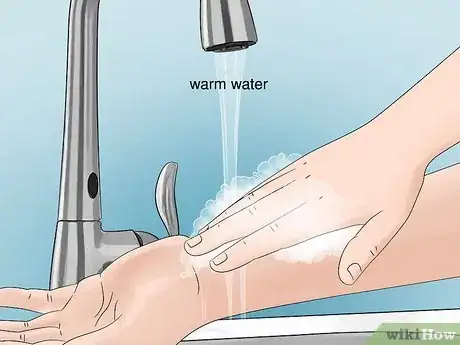






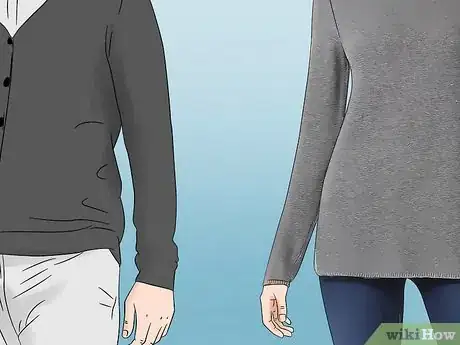






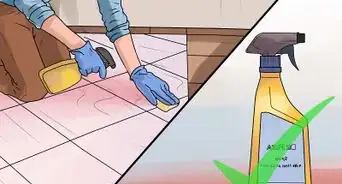
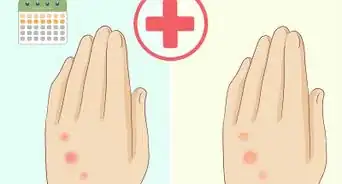
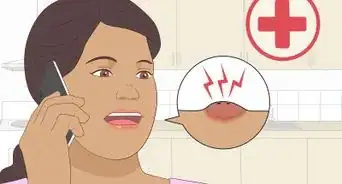
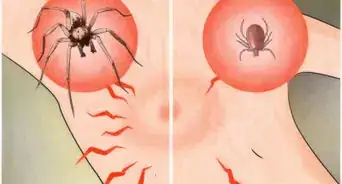
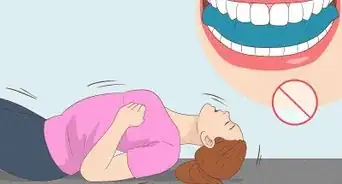


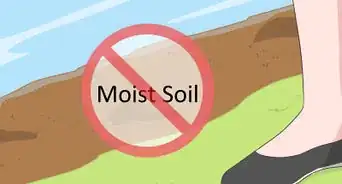

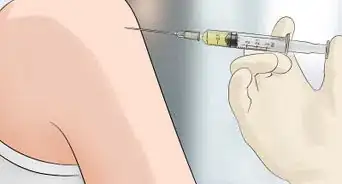
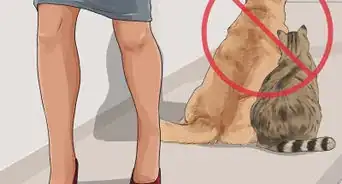













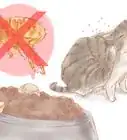
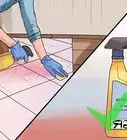



































Medical Disclaimer
The content of this article is not intended to be a substitute for professional medical advice, examination, diagnosis, or treatment. You should always contact your doctor or other qualified healthcare professional before starting, changing, or stopping any kind of health treatment.
Read More...